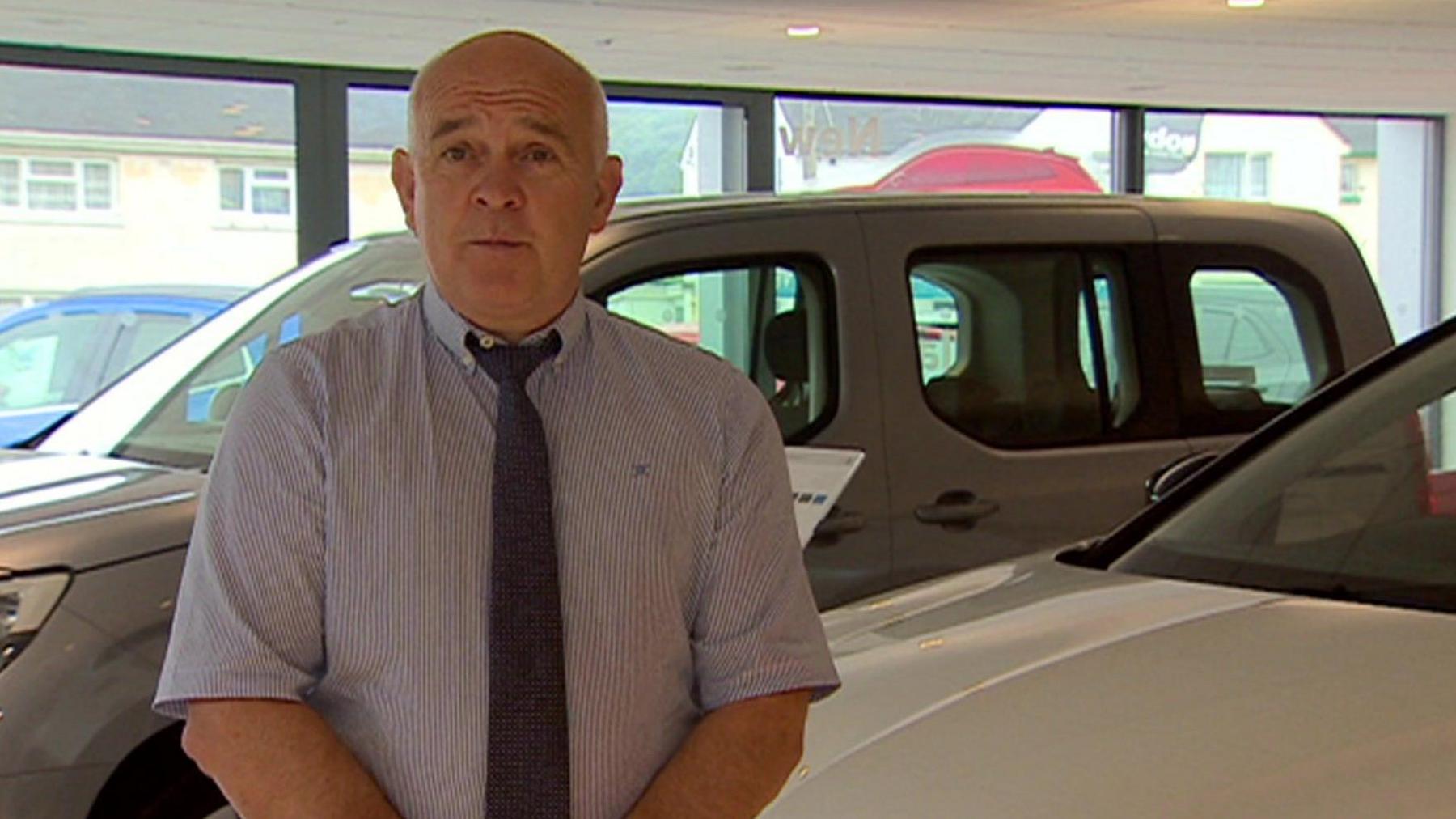Motorists who bought cars on finance could share in billions

Marcus Johnson did not know he would be paying commission on his car finance agreement
- Published
Motorists who bought a car on finance could share in billions of pounds in compensation following a landmark test case.
When Marcus Johnson, 34, from Cwmbran, Torfaen, bought his first car - a Suzuki Swift - in 2017, he was not informed the car dealership was being paid 25% commission, which was added on to what he had to pay back.
In a landmark case with two other claimants, the Court of Appeal ruled in October that the finance company should pay the hidden commission plus interest back to Mr Johnson, and he is now due to receive just over £3,200.
Trade Centre Wales and MotoNovo finance’s parent company FirstRand have not responded to requests for comment.
Lloyds sets aside £450m for car finance probe
- Published22 February 2024
Woman gets £1k car repair bill after firm goes bust
- Published2 June 2024
Mr Johnson said he was “furious” when he found out what had happened, adding: “I paid £1,650 for what I can only describe as showing me around the showroom for 10 minutes and then printing off a bit of paper.
"I signed a few documents and then drove away in the car."
He said he had no option but to use finance when he bought the car, describing it as "heartbreaking" to find out so much extra money had been taken.
"Someone in my situation at that time, not being able to buy that kind of age car with cash, you would use finance," he added.
"And for companies to be able to be allowed to charge these ridiculous amounts of commission without disclosing it, without me being made aware of it at all, myself and thousands of other people."
Mr Johnson bought the car from dealership Trade Centre Wales for £4,600, and the company arranged finance with Cardiff-based MotoNovo Finance.
He was not informed that the dealership was receiving commission of £1,650, which amounted to about 25% of the total he borrowed.
The car finance industry is now setting aside huge amounts of money to settle similar possible claims in the future.
How can you claim?
It is important to log your claim as soon as possible, according to Martin Lewis, external of Money Saving Expert.
He said claimants did not necessarily need to go via a claims management firm, which would take a cut of any payout.
Mr Lewis advised people first determine whether their finance agreements included a discretionary commission arrangement and, if it did, lodge a time-stamped complaint to the company.
This was echoed by Rip-Off Britain's legal expert Gary Rycroft, who told BBC Radio Wales Breakfast the legal precedent set by the Court of Appeal ruling meant "secret commission" was deemed unlawful.
He said it was important to check your contracts and ask your car finance company whether it had been disclosed if unsure.
He said non-disclosure made for a clearer case but arrangements "buried in the small print" could still be worth making a claim against.
But he added that, while getting your ducks in a row early was a good thing, there was a good chance lenders would be lodging a Supreme Court appeal, so claims may not be able to be acted upon for some time yet.

Marcus Johnson bought a Suzuki Swift in 2017
Mr Johnson sold his Suzuki Swift in 2020, but after three years of regular payments, he still owed £3,500 which he assumed then was due to the interest on the loan for the car.
“With paying off the agreement for three years, I had only scratched the surface," he said.
Dealerships were not acting outside of the rules and regulations of the industry by taking this sort of commission at that time, but they had a duty to inform their clients.
The court of appeal said “burying such a statement in the small print which the lender knows the borrower is highly unlikely to read will not suffice”.
There have been changes in the rules governing commission since 2021, when the Financial Conduct Authority banned discretionary commission arrangements.
Kevin Durkin, from HD Law, who represented Mr Johnson in the test case, said: “As a financial reward for them being chosen, FirstRand Bank paid Trade Centre Wales a commission which Marcus knew nothing about.
"There was only a vague reference to this arrangement in the paperwork which the court of appeal found was buried.
"As such it meant that Marcus paid more than he necessarily needed to.”
He added it was far from being an isolated case, with many car dealerships and finance companies having operated in this way.
“It’s completely widespread," he added.
"Almost all cars that are purchased on finance through a dealer or credit broker are sold in this way.
"I’ve yet to see any terms and conditions in a case involving my clients where the terms and conditions reference is either absolute in terms of ‘we will receive a commission’ or alternatively is made prominent in the paperwork that is being signed.”
Mr Johnson said he would never use a finance agreement again, but was delighted when the Court of Appeal found in his favour.
“It was a big moment of relief and excitement and obviously happiness all at the same time – especially with how tough things are at the moment," he said.
He said he hoped others would also get money back, adding: “I’m so happy that my case and the decision that was made could potentially help thousands of other families, to me that’s worth more than the money that I reclaimed in a way."
Related topics
- Published1 August 2024

- Published15 July 2024
